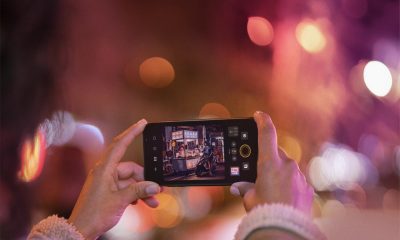Technology
Wireless charging, 5G, and a stunning 120Hz display

OnePlus 8 Pro
The Good
Stunning 120Hz display • 5G connectivity • Wireless charging • Upgraded camera sensors • Bigger battery than its predecessor • IP68 rating
The Bad
Pricey • Phone is a bit too large
The Bottom Line
The OnePlus 8 Pro ups the ante with impressive specs, but we’ll have to see if it’s worth the high price.
OnePlus officially unveiled its most feature-packed flagship phone yet, the 8 Pro.
For starters, the OnePlus 8 Pro’s quad camera setup has two 48-megapixel sensors (wide angle and ultra wide-angle) and up to 3x optical zoom.
OnePlus took the refresh rate up a notch to 120Hz on the 8 Pro’s stunningly large display. And, for the first time ever on a OnePlus phone, it supports wireless charging.
For $899 you get 8GB of RAM with 128GB of storage, while the 12GB/256GB configuration costs $999. Both options are available in either Glacial Green or Onyx Black. The larger storage configuration also comes in Ultramarine Blue.
But that’s not all that OnePlus announced. Alongside the 8 Pro, the company also launched the OnePlus 8.
With a starting price of $699, I wouldn’t say it’s “budget-friendly.” But it is less expensive than the 8 Pro with less impressive features (more on that, later). It’s also a bit smaller, which my tiny hands very much appreciate.
We’ve been spending some time with the OnePlus 8 Pro specifically, and have some initial impressions. Be sure to check back for a full review later this week.
A familiar design
On the outside, the OnePlus 8 Pro has a matte-frosted back that looks and feels really sleek. While I wasn’t very sure about the Glacial Green at first, it’s been a fun change from my Forest Green iPhone 11 Pro.
While it’s a really nice color, it’s a little too loud for my taste. I prefer the Black Onyx.
OnePlus continues to incorporate the alert slider on the side.

Image: brenda stolyar/mashable
For the first time, the phone has an IP68 rating which means it’s not only dust resistant but can be dropped up to 1.5 meters of water for up to 30 minutes.
On the right side of the 8 Pro is the power button, which you can hold down to trigger Google Assistant. On top of that is the alert slider to set your phone on silent, vibrate, or ring. Meanwhile, the left side is home to the volume rocker.
On the bottom is a Type-C charging port, dual speakers, and a dual nano-SIM card slot.
A refreshed display
The OnePlus 8 Pro features a 6.78-inch Fluid AMOLED display with QHD+ (3,168 x 1,440 resolution and 531 ppi). So, it’s a lot bigger than the 6.67-inch display on the 7 Pro.
Unfortunately, it’s not very comfortable to use at times because my hands are too tiny. While the 8 Pro is narrow, making it easy to hold with one hand, it’s tough to stretch my fingers far enough across the display to reach apps or buttons without awkwardly cradling the phone.
But such a large display does make for a better viewing experience, especially since the 8 Pro comes with a 120Hz refresh rate. There’s no denying it feels super smooth, especially when scrolling through apps like Twitter and Instagram.
Gotta love that 120Hz refresh rate.

Image: brenda stolyar/mashable
To help preserve battery life, the display goes back to 60Hz when it’s static. But as soon as you start scrolling, it shoots back up to 120Hz.
The 8 Pro also comes with an in-display fingerprint sensor which is very responsive and works super fast. Of course, you can also opt for Face Unlock.
There’s also a Motion Graphics Smoothing feature. It raises the frame rate on video and reduces the motion blur of the graphics. It’s off by default, so you’ll have to go into your Settings to toggle it on.
It currently works with YouTube and Netflix along with the Gallery app. But it only kicks in when you’re in fullscreen mode. As soon you expand the window, you’ll see a notification appear that the feature is on.
Sometimes, it’s a little tough for me to reach buttons on the display with one hand.

Image: brenda stolyar/mashable
I know it works best when you’re watching action films or content with fast motion sequences, but I actually used it to watch an episode of Hot Ones. I played the same video on my iPhone 11 Pro simultaneously.
And, I must say, there is certainly a difference. The only word I can really think of to describe it: trippy. Each time the camera panned across the bottles of hot sauce, it looked so much smoother and easier on the eye. Even sudden movements on the show appeared more swift.
But of course, I will use it to watch some action films to really put it to the test.
A more powerful quad camera setup
It’s got a bit of a large camera bump,.

Image: brenda stolyar/mashable
I’m going to start out by saying I’m really sad the OnePlus 8 Pro doesn’t have a pop-up selfie camera like the 7t Pro. I always thought it was a cool feature that really set it apart from other flagship phones.
OnePlus left it out this time around in an effort to simplify the design. It also shaves off some weight, but not by that much. The 8 Pro weighs 7 ounces in comparison to the 7t Pro which comes in at 7.27 ounces.
Regardless, you can still hide the hole-punch selfie camera on the new phone via the Settings. As far as specs go, the front-facing sensor comes in at 16-megapixels.
Below are two selfies, one was taken with the OnePlus 8 Pro and the other with the iPhone 11 Pro.
Taken on the OnePlus 8 Pro.

Image: brenda stolyar/mashable
While I truly don’t want to admit this, the OnePlus 8 Pro is definitely more true to color. Yes, I am unfortunately that pale in real life.
Taken on the iPhone 11 Pro.

Image: brenda stolyar/mashable
Meanwhile, the iPhone 11 Pro gives me a bit of color and adds a yellowish tint to my skin. The pillows and tapestry in the background are also aren’t that bright in real person.
On the back, the 8 Pro has a quad camera setup that includes a 48-megapixel “main” camera (f/1.7), an 8-megapixel telephoto lens (f/2.44) with 3x optical zoom, a 120-degree 48-megapixel ultra-wide angle lens (f/2.2), and a 5-megapixel color filter camera for lighting effects and filters (f/2.4).
In comparison, the 7T Pro had a 48-megapixel main camera sensor, 117-degree 16-megapixel ultra-wide angle lens, and an 8-megapixel telephoto lens (also with 3x optical zoom).
The camera bump on the 8 Pro is a little obtrusive. If it bothers you, I recommend putting a case on it to even it out.
I haven’t tested the camera fully but here are some samples I took when I first got the phone. From my initial impressions, the quality looks a bit oversaturated.
The pinks look a little over saturated.

Image: brenda stolyar/mashable
These flowers look a little washed out.

Image: brenda stolyar/mashable
My dog looks cute, though.

Image: brenda stolyar/mashable
I also tested the 30x lossless zoom, which you can see below.

And, while I still have more testing to do, I can already tell it doesn’t come out as clear as the photos I took on the Samsung Galaxy S20.
Under the hood
The 8 Pro packs Qualcomm’s latest Snapdragon 865 chipset and X55 modem for 5G connectivity. Verizon customers will have sub-6 and mmWave capabilities while those on T-Mobile will only have sub-6.
Sub-6 is considered low-/mid band and uses frequencies below 6GHz. It doesn’t require the use of new transmitters, so it’s more likely that it’ll reach more people.
Meanwhile, mmWave is the complete opposite. Because it’s over 6GHz, it not only requires newer transmitters, but more of them. So it doesn’t have as wide of a range that sub-6 does.
I’ve said this about the S20 Ultra (and really all the 5G phones at this point), you shouldn’t jump on purchasing this phone strictly for the 5G.
The OnePlus 8 Pro runs Android 10.

Image: brenda stolyar/mashable
It’s available in certain cities across the nation, but not everywhere. I roamed New York City two or three times to track it down and had no luck. So, it’s highly unlikely I’ll find it while quarantined in New Jersey but perhaps I’ll go on an adventure.
In terms of operating system, the phone runs OxygenOS based on Android 10. It comes with Dark Theme 2.0 (OnePlus’ dark mode), which will be optimized for apps including Reddit, Google Pay, Tinder, and PayPal.
Battery life and wireless charging
Hello, wireless charging.

Image: brenda stolyar/mashable
As for battery life, the 8 Pro has a 4,510mAh battery. At the time of writing, I’ve been using the phone for over 24 hours—specifically for apps like Messenger, Telegram, Twitter, and Instagram. I also used it to make a few phone calls—and it’s currently at 31 percent.
But I’ll admit, it was a very busy day, so I wasn’t scrolling through social media and answering messages as much I usually do. It still needs to be put through a few days of standard use, which includes taking it out to test the camera.
The 8 Pro comes with Fast Charge. In the box, you get a Warp Charge 30 Power adapter that delivers 50 percent charge in 23 minutes.
The new flagship also supports wireless charging, which is a first for any OnePlus phone. To accompany the new feature, the company launched its very own 30W wireless charging stand. OnePlus says it can to charge the phone from zero to 50 percent in 30 minutes.
It’s sold separately though, so you’ll have to shell out an extra $69.96 for it.
But since it’s Qi-enabled, you can really use any wireless charging stand or pad. Or, you can use the OnePlus charging stand to power up other phones that support wireless charging (at 5W).
Don’t forget the OnePlus 8, though
As far as main differences go, there are a few to point out.
The OnePlus 8 is a bit smaller than the 8 Pro. It comes with a 6.55-inch Fluid AMOLED display with 1,080 x 2,400 pixel resolution with 402 ppi.
In addition to green and black, the phone also comes in a really cool color called Interstellar Glow, which changes depending on how the light hits it.
On the back is a triple camera setup which includes a 48-megapixel main camera (f/1.7), a 116-degree 16-megapixel ultra wide angle lens (f/2.2), and a 5-megapixel macro camera (f/2.4).
The OnePlus 8 packs a smaller, 4,300mAh battery but, like the 8 Pro, supports 30W fast charging and wireless charging.
Both the OnePlus 8 and OnePlus 8 Pro will be available starting April 29 via the OnePlus site and on Amazon. As for carriers, you can get them through both Verizon and T-Mobile.
-

 Business6 days ago
Business6 days agoTikTok Shop expands its secondhand luxury fashion offering to the UK
-

 Business5 days ago
Business5 days agoUnitedHealth says Change hackers stole health data on ‘substantial proportion of people in America’
-

 Business6 days ago
Business6 days agoMood.camera is an iOS app that feels like using a retro analog camera
-

 Business4 days ago
Business4 days agoTesla’s new growth plan is centered around mysterious cheaper models
-

 Business3 days ago
Business3 days agoXaira, an AI drug discovery startup, launches with a massive $1B, says it’s ‘ready’ to start developing drugs
-

 Business5 days ago
Business5 days agoTwo widow founders launch DayNew, a social platform for people dealing with grief and trauma
-

 Entertainment4 days ago
Entertainment4 days agoTesla’s in trouble. Is Elon Musk the problem?
-

 Business4 days ago
Business4 days agoUK probes Amazon and Microsoft over AI partnerships with Mistral, Anthropic, and Inflection






















